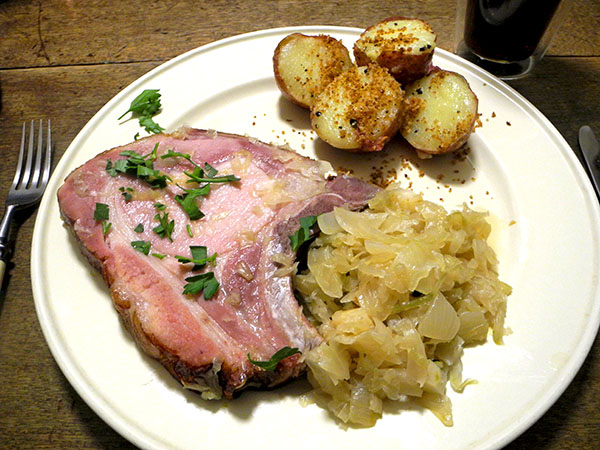
It was a snow day. It felt like a holiday. It was also pretty cold outside (and we still haven’t turned on the heat inside), so a warm kitchen felt right. I had all the makings for a traditional German entrée inside the apartment, and we also had some terrific beer.
We had a terrific, traditional German dinner. Also, nearly everything in it came from farms in the area (our area, not Germany, which somehow makes it even more special).
We usually drink wine with our meals at home, partly because we both much prefer draught beer to bottled, but two of the beers we spotted at Schaller & Weber last week were very special to us: These Rauchbiere are from the area of Northern Bavaria from which my mother’s family emigrated to Wisconsin almost 175 years ago. In addition, both unusual and quite rare, we had thoroughly enjoyed them at Schankerla, the beautiful Brauereiausschank of the brewery itself, 5 years ago, with Barry’s mother, and we had never forgotten those pleasures. With some of the entrées however, we also had enjoyed good Franken wine, in a Bocksbeutel.
Smoked bier is not a gimmick, but an ancient tradition which continues today, and from our own experience alone, with good reason. Five years ago Barry described his first taste, “Nice and smoky like bacon in a glass.”
My maternal great-great-grandparents, who were from Franconia, but not Bamberg itself, may never have had Rauchbier. If they had, they might never have left.
- one 16-ounce glass jar of sauerkraut (simply cabbage and salt) from Millport Dairy Farm, drained and very well-rinsed in several changes of cold water, drained again and placed in a large enameled cast iron pot with one chopped onion from Tamarack Hollow Farm, one chopped parsley root (in lieu of the more traditional carrot) from Norwich Meadow Farm, half a dozen whole allspice berries and an equal number of Tellicherry peppercorns, a little salt, 2 Sicilian bay leaves from Buon Italia, about 8 ounces of beer (a bottle of Peroni, which had already been opened and kept in the refrigerator, some of it having been used in an earlier meal), a little water as needed, and a tablespoon of olive oil, all brought to a boil and then simmered over a low flame, stirring occasionally, for about half an hour, covered, and then uncovered for 20 or 30 minutes more before two 9-ounce smoked pork chops from Schaller & Weber, having first been briefly seared on both sides inside a dry cast iron pan, were buried in the sauerkraut, heated for about 20 minutes, the chops and sauerkraut arranged on 2 plates and sprinkled with chopped fresh parsley from Eataly
- a small pot of some pretty good ‘Organic German Mustard’ from Whole Foods served on the side
- two Dark Red Norland potatoes from Norwich Meadows Farm, scrubbed, boiled unpeeled in heavily-salted water until barely cooked through, drained, halved, dried in the still-warm vintage Corning Pyrex Flameware blue-glass pot in which they had cooked, a couple tablespoons of rich Kerrygold Pure Irish Butter [with 12 grams of fat per 14 grams, or each tablespoon of butter; American butter almost always has only 11 grams, which makes a surprising difference in taste and texture], the Saltzkartoffeln arranged on the plates with the chops and the sauerkraut, and sprinkled with homemade breadcrumbs which had first been browned in a little butter
- the beer was from Germany (Franconia), two different versions of a very special Bamberg Rauchbier (smoked bier), Aecht Schlenkerla Rauchbier Märzen, and Aecht Schlenkerla Eiche Dopper Bock, from Schlenkerla, in Bamberg, both purchased at Schaller & Weber here on 2nd Avenue
- the music was, no surprise, Georg Solti’s 1959 recording of Wagner’s 1854 opera, ‘Das Rheingold’, with the Vienna Philharmonic